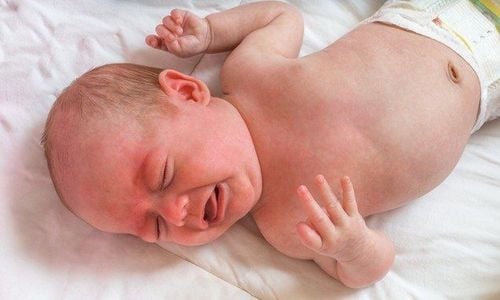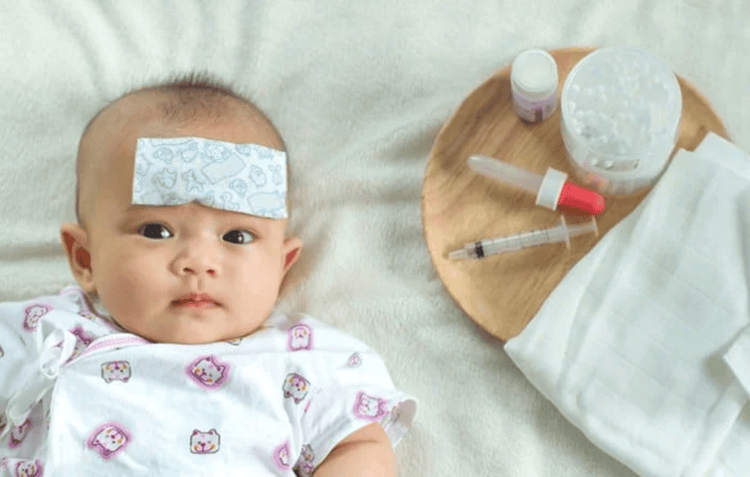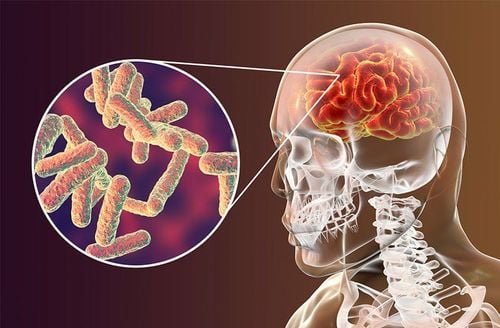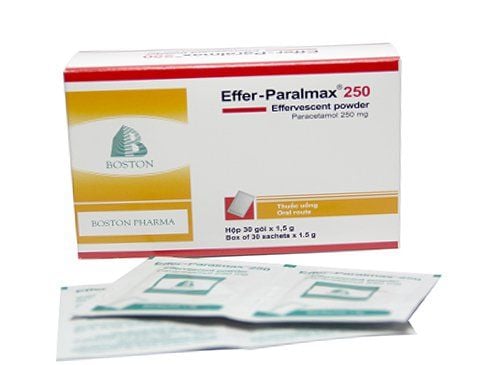This is an automatically translated article.
Fever is defined as a measured body temperature of 38 degrees Celsius or higher. Fever is the body's defense response to pathogens. Thus, fever is a beneficial response, however, children with fever are often accompanied by fussiness, irritability, anorexia and weight loss.
1. Complications of fever
Severe and prolonged cases of fever can lead to other serious symptoms such as dehydration and rapid heart rate. The most feared complication is febrile convulsions, accounting for about 3-4%, most common in children under 5 years of age. A small number of cases of febrile convulsions cause physical damage to the nervous system, affecting the child's later brain development. Detecting a child with a fever, especially a child with a high fever, is an important thing that parents need to pay attention to.

Sốt cao co giật là biến chứng đáng sợ nhất ở trẻ
2. Classification of fever by cause
In general, a child's fever can be indicative of many different illnesses. Accordingly, the causative agents of fever in children are also very diverse, divided into two main groups: viruses and bacteria. Distinguishing between the two groups of pathogens is beneficial for treatment, but it is not always easy to do.
Viral fever, commonly known as viral fever, accounts for the majority of fever cases in children. Different viruses can cause similar symptoms, including fever, so determining exactly which virus is causing illness in children is challenging. Children are infected with the virus through many different ways such as breathing, digestion, by injection or can be transmitted directly from the mother to the baby during childbirth. Respiration is the most common route of disease transmission, the virus is very easily spread from one person to another when sneezing, talking, so it is easy to cause an outbreak to become an epidemic. For children going to schools, the virus can appear in the surrounding environment such as tables, chairs, stair handrails, toys and enter the child's body. On average, a healthy child can contract the virus 5 to 10 times a year. Viral fever usually presents as an acute episode of fever, a sudden high fever that does not last more than 7 days.
Bacterial fevers usually make up a small part of all cases of fever in children. Unlike viruses, bacterial agents can cause a gradual onset of fever, accompanied by signs of infection. However, in clinical practice it is difficult to distinguish the causative agent of a fever in a child as bacterial or viral because the symptoms present are not always specific to each type.
When a child has a fever, parents are not allowed to arbitrarily treat the child with antibiotics. This spontaneous practice will increase the risk of antibiotic resistance, affect later treatment and harm the child's later development.

Trẻ bị sốt có thể là nguyên do rất nhiều bệnh lý khác nhau
3. Classification of fever according to clinical course
3.1 Acute Fever Acute fever is defined as a fever that comes on suddenly, lasts about 3 days, rarely lasts longer than 1 week. With babies a few months old, the most common cause is teething. Fever when teething is considered a physiological response of the body, parents should not be too worried. However, it is still necessary to monitor fever symptoms whether the baby is teething or not because this can be a sign of other diseases. If fever persists for more than 48 hours, accompanied by signs of hemorrhage, consider dengue fever and bring the child to the hospital immediately. The most common cause of acute fever is a virus, also known as a viral fever. Parents need to monitor their children carefully so that they can promptly detect warning signs and take them to the hospital in time.
3.2 Persistent fever Persistent fever is defined as a child's fever persisting for longer than a week and always requiring medical attention. Cases of intermittent fever, alternating fever days with non-febrile days are not classified as persistent fever. The causes of persistent fever are often complex, difficult to determine, and dangerous. Faced with a case of prolonged fever in a child, doctors need to do a thorough examination and prescribe subclinical tests such as blood count, ultrasound, and X-ray. Parents are not allowed to arbitrarily treat with common fever-reducing drugs because it endangers the child's life and loses the opportunity to receive timely treatment.
When the child has a fever, parents need to monitor the child regularly. Detect warning signs to promptly take the child to the nearest medical facility if the child's situation worsens.
As a key area of Vinmec Health system, Pediatrics Department always brings satisfaction to customers and is highly appreciated by industry experts with:
Gathering a team of top doctors and nurses in Pediatrics : consists of leading experts with high professional qualifications (professors, associate professors, doctorates, masters), experienced, worked at major hospitals such as Bach Mai, 108.. Doctors All doctors are well-trained, professional, conscientious, knowledgeable about young psychology. In addition to domestic pediatric specialists, the Department of Pediatrics also has the participation of foreign experts (Japan, Singapore, Australia, USA) who are always pioneers in applying the latest and most effective treatment regimens. . Comprehensive services: In the field of Pediatrics, Vinmec provides a series of continuous medical examination and treatment services from Newborn to Pediatric and Vaccine,... according to international standards to help parents take care of their baby's health from birth to childhood. from birth to adulthood Specialized techniques: Vinmec has successfully deployed many specialized techniques to make the treatment of difficult diseases in Pediatrics more effective: neurosurgery - skull surgery, stem cell transplantation. blood in cancer treatment. Professional care: In addition to understanding children's psychology, Vinmec also pays special attention to the children's play space, helping them to have fun and get used to the hospital's environment, cooperate in treatment, improve the efficiency of medical treatment. To register for examination and treatment with Pediatricians at Vinmec International General Hospital, please click the "Contact Us" button on the website or register online HERE.
MORE:
Fever in Children: A Guide to Accurate Temperature Measurement - When to Treat? How much fever does a newborn baby need to take to reduce fever? Temperature measurement locations determine the child has a fever













